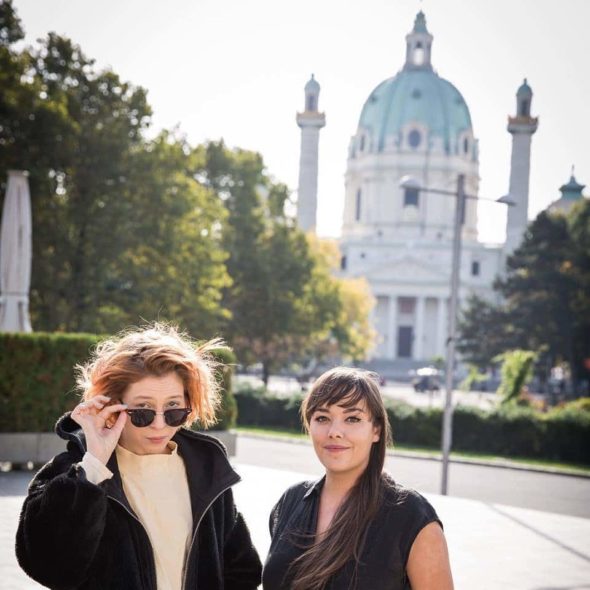
YASMO (YASMIN HAFEDH) is a rapper, author and producer of YASMO & DIE KLANGKANTINE and one of this year’s POPFEST curators. YASMO & DIE KLANGKANTINE recently released their second studio album, “Prekariat und Karat” (Ink Music). Ada Karlbauer met YASMO, RALPH MOTHWURF (composer, producer, guitarist) and TOBIAS VEDOVELLI (composer, producer, bassist) to talk about the new release. It was about content awareness and the the striking, about the lack of sustainability of trends and hypes, about contrasts, areas of tension and free spaces, legacy, self-locations and the idea of genius as a degenerate lifestyle.
The second studio album “Prekariat und Karat” was released at the beginning of March.
Yasmin Hafedh: We made the album last year, worked hard on it and put a lot of love into it. We took a lot more out of this album and thought less about the listeners and took up every freedom we could have. We defined it as a studio album because there are a few songs that have instruments built in that wouldn’t occur live. With the first album, which was released in 2017, we were still looking for our sound and eventually found it. Now we go one step further and ask ourselves how we can push the boundaries even further.
How would you characterize the musical development from your first live program through the search for your own sound to the present day?
Yasmin Hafedh: In the studio album context, we decided to work in a more reduced way. We are a nine-member band. We can use everyone, but sometimes we can als take a conscious step back and have someone take a break. On the other hand, we can also get more friends to join us. We can simply try out things that exceed our own comfort zone. On a lyrical level it has also become much more personal, and that was also a nice step.
Ralph Mothwurf: We were also able to optimise certain things with regard to the overall staging. We didn’t claim to be a backing band, but that Yasmo & the Klangkantine are a coexistence. We try to expand the balance to such an extent that there is a harmonious balance between Yasmo as “Master of Ceremony” and instrumental music, rap, lyrics and jazz.
Yasmin Hafedh: We have all evolved in many different areas and can all contribute with our knowledge. This simply makes us much broader in scope. With nine people, we have a huge amount of resources.
Artistic cooperation plays an essential role on the album. Which artists have been featured on “Prekariat und Karat”?

Tobias Vedovelli: There are two songs on the album where we worked together with other artists. One is a song Ralph wrote for Yasmo and Max Gaier [5/8erl in Ehr’n]. The other one is a number of mine called “Interview”. Christoph Grissemann can also be heard on it. “Interview” is more or less about the fact that Yasmo often has to deal with sexism à la “How is that for you Yasmo, to do the whole thing as a woman?” We thought to ourselves that we’d simply exaggerate and put it into the context of a song that is also musically very funny, because there’s no actual refrain. It just goes on, there is a lot of variation, there is this constant dialogue between Grissemann as interviewer and Yasmo.
Tobias Vedovelli: Actually we have a lot of other feature guests as well as friends who are not mentioned by name on the record. It was a really cool, versatile project.
An exemplary passage of your number “Girls just wanna have fun” reads: “Please read a little Butler, her writing is not complicated. I just want you to understand the principle of feminism. We’re not here to take anything from you, you won’t lose anything. Let’s serve this piece of cake together. (…) And get into your head that there are many women playing. Google them, I’m not a women’s quota, but one of many” – What are your personal thoughts about the prevailing inequalities in the music business and beyond?
Yasmin Hafedh: Change the situation! We are already doing that, but we won’t stop until something has changed significantly. This doesn’t just apply to the music business, it’s a social shift that takes place. We want to raise more awareness. Even the privileged, who can make themselves comfortable, are challenged to participate!
“[…] WE LIVE IN AN EXTREMELY CONTRADICTORY TIME.”
What is the album with the dichotomous title actually about?
Yasmin Hafedh: The point is that there is no way without any contradictions. That there is not only black and white, right and left, top and bottom, but also that there are many nuances and colours. On “Prekarariat und Karat” we look at these nuances and contradictions. There isn’t a contradiction to be found in every song, but I think we live in an extremely contradictory time. You don’t know how you can pay the rent next month, but the next round’s on you because today we celebrate and it looks good on Instagram. We’re losing a bit of reality and at the same time get upset about the loss of reality, even though we could just put the phone away. I think reception is something very important, that art only becomes art when it is received. That the dialogue between artists and recipients is very important.
Keyword: Current events. How do you strike a balance between content sensitivity and directness without slipping into populism?
Yasmin Hafedh: Before I tackle a topic that I could only deal with in a populistic way because I know too little about it, I go to a library and do research. But you can also be populist, there has to be room for that. You should always use the populism consciously and not simply follow a trend. Hypes and trends have always existed and will always exist, but they are not sustainable and have an interest in innovation or progress.
“[…] IF WE LET OUR OPTIMISM ABOUT THE FUTURE BE TAKEN AWAY, THEN WE GIVE UP EVERYTHING THAT MAKES US FREE. “
No room for cultural pessimism?
Yasmin Hafedh: On our album we try to convey that we’re not afraid of the future. So, absolutely no cultural pessimism. The only constants we have are death and change. It is understandable that people are afraid of change and uncertainty, but I believe that if we let our optimism about the future be taken away, then we give up everything that makes us free.
Ralph Mothwurf: The album always plays with these moments of extremely classic, sometimes hackneyed clichés that are quite simply funny, and uses and exploits them. If you use these moments as a conscious counter-pole to something very abstract, then you get a very exciting musical tension.
Even if hypes and trends tend to have no sustainability, what do you currently celebrate musically in Austria?
Yasmin Hafedh: I think it’s great that Austria has so much attention at the moment. That’s what hype is good for, because it generates attention and makes you visible. It may be in an extreme state, but it makes you visible. I think the Austrian hype is fantastic, because there is a lot of great music and talented people here. Austria is so reclusive in everything it does that it creates space for things that would otherwise not come out. I think that’s very good.
“VIENNA, YOU MULTIETHNIC CITY, SHOW ME YOUR TREASURES!”
Together with Mira Lu Kovacs you will also create the programme for this year’s pop festival. How did you approach the curating?
Yasmin Hafedh: It’s very nice to work with Mira Lu Kovacs. We both have a similarly ambitious work attitude and know the paths that you have to take as a musician in Austria. With this knowledge it was actually very easy to find common ground for our concept paper. Subsequently, every wish was noted down, which was then surprisingly congruent. Then we started to go through all the mails, listen through them and filter them. We were able to contribute a lot of ideas and are looking forward to it. True to the motto: “Vienna, you multi-ethnic city, show us your treasures”.
What opportunities but also difficulties does the Popfest offer as a well-frequented free festival?
Yasmin Hafedh: For example, the Popfest offers musicians a larger stage and greater media access, which many don’t have at the beginning of their career. Because the audience at Popfest is completely mixed, it offers the opportunity to reach circles that you would otherwise not be able to reach. Mira and I went a lot further after our respective Popfest concerts. The difficulty mentioned here is probably the old story of the evil free festival, which is supposed to keep all people away from concerts with admission. That´s bullshit in my opinion.

“[…] THE LEGACY OF THE PAST DOESN’T PRESS SO HARD ON POP.”
Pop music and self-identification as pop musicians are still a no-go for many artists. How do you feel about it?
Ralph Mothwurf: I have the feeling that’s over. That’s this Nirvana generation.
Yasmin Hafedh: I love pop. There’s good and bad in everything, but well done pop is the best there is.
Ralph Mothwurf: Wow [laughs]. I wouldn’t say it like that. Pop used to be understood as completely commercialized music. But what I have noticed is that pop music can actually be the most free medium of all, because the legacy of the past doesn’t weigh so hard on pop. Pop music also is a genre that cannot be reduced to musical parameters. Pop music is a way of thinking that is extremely adaptive. Pop doesn’t have to correspond to some generic scheme.
Yasmin Hafedh: That’s what I mean by “well done pop”. One political claim I make is that there are open approaches to both production and reception, and that pop makes possible like hardly any other genre.
Tobias Vedovelli: Yasmo & die Klangkantine profits extremely by the fact that we are perceived as pop, even though there is a lot borrowed from a variety of musical genres. Artists can imagine themselves to be pioneers, but in fact there will always be references and associations.
What about anonymous hatred and haters in digital space?
Yasmin Hafedh: Even though we express political messages, there are surprisingly few Haters. I think that because we don’t use populist slogans, we offer less possibilities for attack. Because of this we don’t generate that much hatred. I am actually very happy about that. I believe that dialogue, positive messages, and appreciation go much further.
Tobias Vedovelli: But you also have to be honest: We make niche music and only get airplay on FM4 and Ö1. We reach people who consciously listen to our music and want to understand it lyrically and musically. When you leave the usual context, you notice especially in forums, that political messages aren’t received so well. That was the case when we played live at the foyer of the STANDARD editorial office.
Thank you very much for the interview!
Ada Karlbauer – translated from the German by Dave Dempsey (abbreviated version)
Links:
Yasmo und die Klangkantine (Website)
Yasmo und die Klangkantine (Facebook)
Popfest Wien
